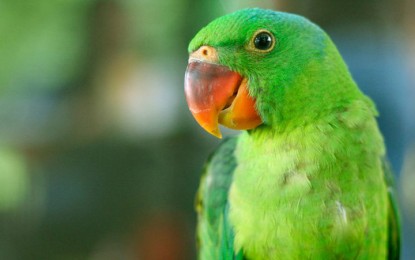
ENDEMIC. A photo of an adult blue-naped parrot (pikoy). Habitat loss and trapping made this Philippine endemic species scarce on most islands except Mindoro and Palawan. (Photo by Celeste Anna R. Formoso)
PUERTO PRINCESA CITY, Palawan -- Environment enforcers in Palawan have recovered 47 hatchling and juvenile mynahs and blue-naped parrots from suspected illegal wildlife trading operation in the southern Palawan municipality of Quezon.
Jovic Fabello, spokesperson of the Palawan Council for Sustainable Development Staff, said in an interview on Tuesday afternoon that the birds were seizedon Monday at Sitio Sumil, Barangay Suwangan, Quezon town by operatives of the 2nd Special Boat Unit (SBU) of the Philippine National Police Maritime Group and the Bantay Palawan Task Force.
The 35 mynahs (kiyaw) and 12 blue-naped parrots (pikoy) were confiscated from the two suspects identified as Ariel Bustamante and Ariel Rapana.
Cases of violation of the RA9147 or the Philippine Wildlife Act or An Act Providing for the Conservation and Protection of Wildlife Resources and their Habitats have been filed against the two suspects.
“We received a tip about the birds, that’s why we were able to confiscate them. This goes to show that our community listening posts are working with the municipalities. We use this enforcement plan to strictly implement the wildlife act,” he said.
They were kept in small improvised cages by the suspects in the remote area of Sumil, where the possibility of detection was almost nil, said Fabello.
He said the suspected illegal bird traders kept the cages behind a small waterfall behind a house in the distant village. The strong sound of the cascading waters concealed the noise made by the birds.
“It’s sad because they are still newly-hatched and the others are juvenile. We learned that they’ve made their first shipment we just were not able to stop them. Thankfully, we stopped the second,” he said. (PNA)
